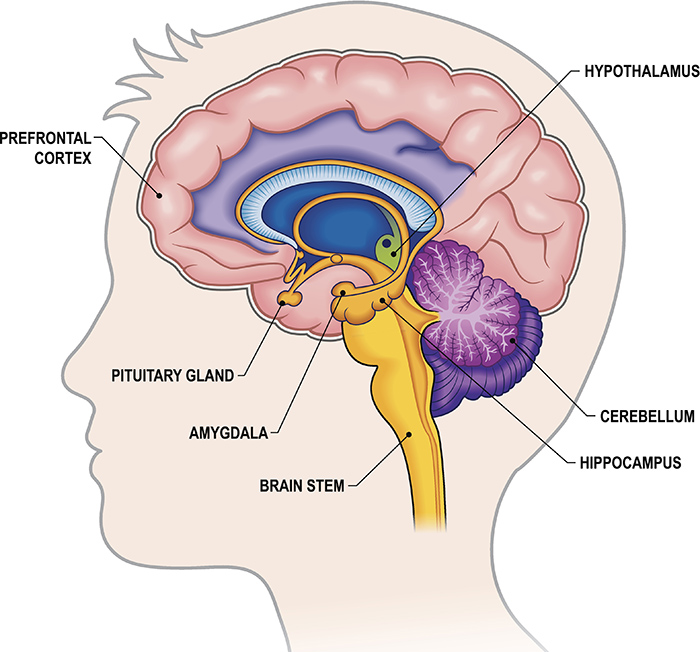OK, so we are going to start this reflection with a little neuroanatomy….has that prospect caused you to leave the reflection yet…how about now? Stay with me here. I promise when we are done you will be just a little bit smarter…or a little bit more ready for a nap. I will warn you…this will not be romantic.
Our brains are made up of two general areas. Now there are many, many divisions of the brain. But, at its core, there are two primary areas of the brain. One is called the Limbic System and it contains an important component, the Amygdala, that is involved in the formation of emotions. Particularly fear and happiness. It is controlled by neurohormones such as dopamine and serotonin. Outside triggers, such as positive and negative experiences and circumstances, can result in activation of the limbic system and generate these emotions. Emotional responses from the limbic system are often fleeting though they can cause the imprinting of long lasting memories of the events which triggered the emotional response. Got it?
Now, the other main portion of the brain is the Cerebral Cortex. Where the limbic system is often referred to as the “primitive brain” or the “reptilian brain”, the cerebral cortex is a characteristic of species who possess the ability to engage in higher thinking and reasoning. The limbic system has the main responsibility to react quickly in times of stress. It is almost considered a reflex response center. The Cerebral Cortex, however, is seen more as the area of the brain that takes multiple inputs and coordinates them over time into a series of responses and learning, or memories. We see slower, more long lasting, behaviors resulting from activity of the Cerebral Cortex.

Still with me? Now what the heck does this have to do with the Catholic Faith? Well, almost everything. Let’s look at the Gospel reading for today.
The 72 disciples have just returned back to Jesus after going out on their own for the first time. Curing illness and driving out demons. They return to essentially high-five each other and Jesus in their excitement with what they experienced. The first verse today says it all:
The seventy-two disciples returned rejoicing and said to Jesus,
“Lord, even the demons are subject to us because of your name.”
They returned REJOICING!! And what does it mean to rejoice? To show great joy. The disciples were joyful. The Bible does not say that the disciples were happy. Why not? Aren’t joy and happiness the same thing? No sirree Bob.
Happiness. It is an emotion that is triggered by outside circumstances. Something that is done TO a person or something that is experienced BY a person. You win a sports contest. You get a good grade on a test. You latest stock pick sores in price. The thing with these experiences is that they are short lived. And the hormones that dictate functioning of the limbic system are short lived. They fade quickly. Worse yet, the more they are triggered, the more that is needed to get the same response. It is the source of addiction. You need more to feel the same level of pleasure.
Joy. A different story. Joy is more complicated. It is a deeper sense of well being. A developed belief in oneself. The Cerebrum has connections to every aspect of your brain and body. It coordinates what you experience and how you respond. But it is not a reflex. It is a conscious series of decisions and responses that build up your world view. Irrespective of momentary successes or setbacks. Not that you would not experience happiness or despair. It is just that, with a true sense of Joy of who you are, these momentary experiences will fail to define you.
And this is where our faith comes in. If we have Christ as our center. As the main constant in our lives. We have a foundation we can lean on in ANY situation. God the same as yesterday, as today and tomorrow. It is said that if we are filled with the Spirit of God, the living water, then the vessels of our lives leave little room for those things that others use to try to define us. We remain children of God. I think of joy as a shield that protects us from the ups and downs of daily life. When the limbic response fades…as it always does…joy in Christ remains.
These things I have spoken to you, that my joy may be in you, and that your joy may be full. (John 15:11)
The song “Blessed Be Your Name” comes from the book of Job. The words highlight the constancy of God in our lives, and the joy that remains, regardless whether things are going well or turn against us:
God loves you always. He sent His Son to die so that we may have eternal life. If the prospect of eternal life does not infuse you with JOY, what will? Even death is pale in comparison to the joy of life eternal with God. All else, as it says in Ecclesiastes, is vanity. Or should we say just brief surge of dopamine in the circuitry of the Amygdala. Now how romantic is that?
